Republic of Moldova Grant Assistance for the Food Security Project for Underprivileged Farmers (2KR)
Learning from an Example of Utilizing the Counterpart Fund
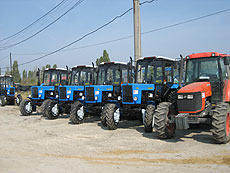
Procured agricultural machinery
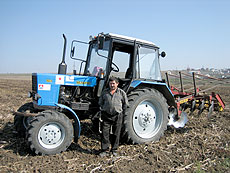
Farmer who purchased the tractor. The tractor has a sticker saying "from the people of Japan" with a Japanese national flag.
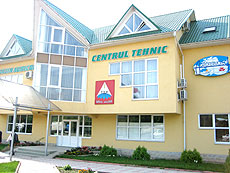
Project Implementation Unit (PIU). There is a sign "2KR JAPONIA-MOLDOVA (Japan-Moldova)" at the entrance.
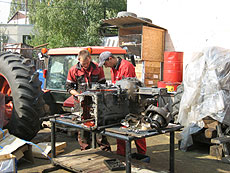
At the PIU's workshop: participants maintain a tractor
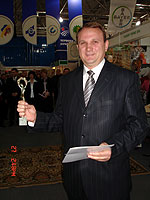
PIU, whose activities were recognized, won the grand prize at the exhibition of agricultural machinery
- Aiming more effective assistance -
The Republic of Moldova, one of the countries that constituted the former Soviet Union, is located between Ukraine and Romania.
Since the break-up of the former Soviet Union in 1991, Moldova had faced extreme difficulties due to the confusion in the economy after the supply in energy and commodities were cut off as well as a series of conflicts and disasters.
There is no outstanding industry other than agriculture and tourism, and the severe economic difficulty continues. The harvest of agricultural products has been on the decrease, and many farmers gave up their farming lands, being unable to purchase brand-new agricultural machinery to replace with the worn-out machines.
In such a situation, the Japanese government commenced the Grant Assistance for the Food Security Project for Underprivileged Farmers (2KR) (2KR, currently Grant Assistance for Underprivileged Farmers) in 2000 in order to assist their attempt for recovery of Moldova's stagnant agriculture and the stabilization of productivity.
JICS, as a procurement agent that implements procedures of purchasing the agricultural machinery on behalf of the Moldovan government, has procured machinery such as tractors and combines on six different occasions.
Under the 2KR project, accumulating and utilizing the proceeds from selling the procured machinery and equipment (counterpart fund) are stipulated in the recipient country in order to gain more effective assistance outcome. Especially in the Republic of Moldova, the method worked out well to bring a big success.
First, the cumulative total of 296 procured and delivered tractors were sold within the country, and based on the proceeds, additional tractors were procured and sold again. By repeating the process of procurements and sales, 1,700 tractors, about 6 times the original number of the procured tractors and furthermore, total of 2,135 agricultural machines including combines were able to be procured by 2005. The assistance of the Japanese government, as it were, "triggered" and established the system of revolving fund smoothly through the cycle of procurements and sales, and Moldovan people have expressed of appreciation towards Japan's assistance.
Regarding the utilization plan of agricultural machineries, Project Implementation Unit (PIU) established by the Ministry of Agriculture and Food Industry of the Republic of Moldova recruits and selects purchasers, accumulates the proceeds, and organizes workshops for the maintenance and repair of the agricultural machinery in order to maintain the outcome of the grant aid.
At an exhibition of agricultural machinery "MOLDAGRO TECH" held in October, 2007, PIU won the grand prize and was highly evaluated for its contribution to the domestic agricultural mechanization in which the PIU had been engaged.
Assistance is not a temporary matter: we need to seek the sustainable effect by mutually considering the future of recipient country. Most importantly, exercising assistance according to the situation of recipient country is required.
JICS continues further support in order to expand the successful cases of Moldova's counterpart fund cycle.

